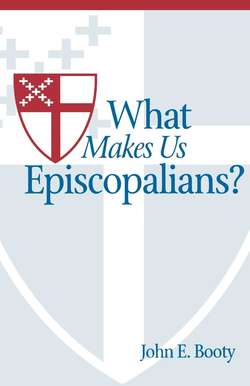Читать книгу What Makes Us Episcopalians? - John E. Booty - Страница 5
На сайте Литреса книга снята с продажи.
Preface
ОглавлениеThis small book reprints for wider use a series of articles commissioned by and printed in The Episcopalian. The subject matter was dictated in a large part by the conviction that over against distorting voices and tendencies there was need to explore our identity as Episcopalians and as members of world-wide Anglicanism. Our identity consists of many things, not the least being the comprehensive nature of our tradition and the way in which people of great diversity are united by a common recognition of Scripture, Tradition, Reason and Experience as authoritative in all that we think, say and do. The comprehensiveness of the Episcopal Church is not placid and sterile, as some believe. It is characterized by a creative tension constituted by the dynamic interaction of the four poles of authority. This creative tension at times strains and threatens to break the bonds of charity as divers people emphasize one or another of the poles to the exclusion of the others. The threat of schism recurs time and again in the midst of discussions, controversies and confusion, the inevitable consequences of a living church pursuing its mission in a constantly changing society. As Episcopalians we strive to hold to and justly honor the authority of Scripture, Tradition, Reason and Experience in the right proportion, giving full weight to each, acknowledging the proper authority due to each one in their relation one to another. We acknowledge, as we do this, the tension between them and recognize in that tension a creative dynamism. The tension is at times disturbing and sometimes verges upon the intolerable, but it provides to us a lively dynamism and makes it possible for us to adapt to the new without denying the values of the old. That we don't always succeed, that the interactions and tensions are complex and beyond the ken of many, and that being an Episcopalian can be hard work is admitted and I hope illuminated in the following pages. It is this very creative tension that appeals to many questing people in our complex and dangerous era as not only viable but necessary.
Continuous education, through the entire stretch of life, is obviously of vital importance to Episcopalians as they make day-to-day decisions in relation to Scripture, Tradition, Reason and Experience. It is hoped that this little book may serve as a tool in such education. There has already been some use made of the articles as a basis for study and discussion. There are six chapters, the first is introductory and presents some historical background, introducing the main themes, the next four are given over to separate considerations of Scripture, Tradition, Reason and Experience, and the last is a conclusion and reflects on where we have been in the course of our study and on the meaning or meanings of it all. The book could be the basis for a six week study course, during Lent or at some other convenient time. The study leader might want to draw up questions for discussion and assign different members of the study group to begin discussion when the group meets by means of a brief consideration of the question or questions. The study leader might take that responsibility, summarizing the chapter very briefly and initiating discussion. The book could be used in various other ways, in connection with an inquirers class, or it could be put in the hands of individuals who express concern for the matter with which it is concerned. My additional hope is that this small study of great subjects may inspire further adult education projects. In particular, as I remark in the conclusion, I am concerned to see basic Christian education in the Episcopal Church “structured and conducted in terms of the creative interplay of the four vital elements”—Scripture, Tradition, Reason and Experience.
I am indebted to Janette Pierce of The Episcopalian who came to me with the idea for this book and to Judy Mathe Foley, of the same publication, who patiently and expertly edited my typescript. I am grateful to the Rev. Theodore A. McConnell for suggesting that the articles be reprinted in this form and to Anne Doherty for her editorial assistance. Lastly, I am thankful for having been born in and sustained by the Episcopal Church with its appreciation of Scripture, Tradition, Reason and Experience and of the creative tension which their interaction inspires.
John E. Booty
